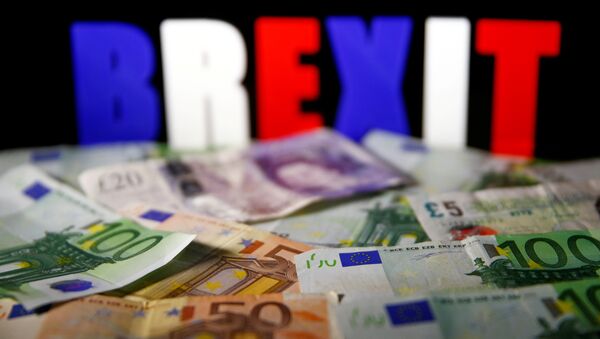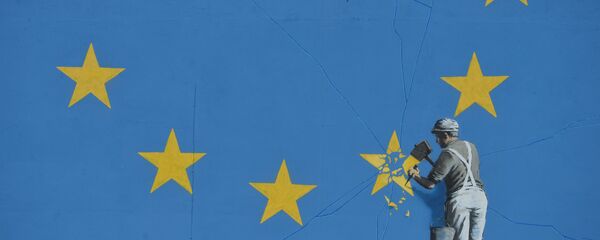Brexit will cost the EU €10 billion [$11bln] alone in lost budget contributions, and the bloc is facing other expensive challenges too, EU Trade Commissioner Gunther Oettinger has warned.
"The departure of the United Kingdom alone leaves us with a revenue shortfall of minimum EUR 10 billion a year," he wrote in the EU Blog on Wednesday.
Oettinger said that with new expenses related to defense and internal security, the total figure could be twice as much. His blog post accompanied a new report he co-wrote with the EU's regional policy commissioner Corinna Cretu, which seeks a way to balance the EU budget after Brexit.
Dr. Giacomo Benedetto, Senior Lecturer in Politics and Jean Monnet Chair at Royal Holloway University of London, told Radio Sputnik that the budget shortfall leaves the EU facing some difficult decisions.
"I think €20 billion is at the higher end of provisions but the withdrawal of the UK creates a hole in the budget. Now, in the short term some of that might be alleviated depending on the agreement for exit with the UK, whether or not the UK will continue to make some payments during a transitional period, so we don't know precisely how much money we're talking about."
"This opens up a potential conflict between some member states about who is going to pay the bills, so Commissioner Oettinger has presented a number of scenarios. One is that in the future we have a smaller budget, which would obviously reflect the exit of the UK and the withdrawal of those monies that the UK would have provided."
In their paper, Oettinger and Cretu said there were two "knee-jerk" responses to the problem: the demand from net contributors for budget cuts and the demand from beneficiaries that contributors increase their contribution.
Rejecting both approaches, they expressed a belief that the "outdated, single-entry bookkeeping approach with its payees and payers" should be abandoned in favor of a "completely new concept" for the EU budget.
Benedetto said that the member states' response to the new budget proposals depends on the package they are presented with by Brussels.
"It depends on the package deal. At the moment, what will happen if there is a gap or even a desire to spend more money than at present, those extra funds would automatically come from each country on the basis of its gross national income, which is similar to GDP."
"One way to avoid that, and for a more acceptable way to finance, is to have some kind of tax-based income besides external tariffs, which apply at the moment."
"For example, when goods are imported into the EU, a tariff is paid at the point of entry. But besides that tariff there is little else financing EU expenditures other than national contributions. So the issue is whether you can introduce essentially tax-based forms of revenue. It could be on transnational corporations that operate across Europe, it could be on carbon usage, there could be a number of derivatives taxes on financial transactions."
"This spillover is for a number of years, the UK had made certain agreements to contribute and the time limit for those is not indefinite. It sounds like a lot of money but it will gradually reduce over the next couple of years. We're talking about figures of between €60-100 billion. I don't think that this threat, if the UK uses it in that way, will be effective with the Europeans."
"As Oettinger's statement and proposal have made clear, they are planning for more than a few possible outcomes of Brexit. So, one possibility is that there is no agreement and the UK departs with no agreement. That's planned for, that's being assessed and measured, and Oettinger's statement takes account of that."
"Likewise, if the UK makes an agreement which the Europeans regard as equitable, there's also a plan for that. So, all of these scenarios have been carefully prepared in Brussels," Benedetto said.





